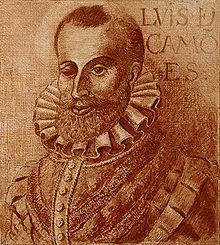Camões
| Luís de Camões | |
|---|---|

Portrait by Fernão Gomes, c. 1577
|
|
| Born | Luís Vaz de Camões c. 1524-1525 Lisbon(?), Coimbra(?), Constância(?) or Alenquer(?), Kingdom of Portugal |
| Died | 20 June [O.S. 10 June] 1580 (aged 55-56) Lisbon, Kingdom of Portugal |
| Occupation | Poet |
| Nationality | Portuguese |
| Alma mater | University of Coimbra |
| Period | Portuguese Renaissance |
| Genre | Epic poetry |
| Literary movement | Classicism |
| Notable works | The Lusiads |
| Relatives | Camões Family |
Luís Vaz de Camões (Portuguese pronunciation: [luˈiʒ ˈvaʒ dɨ kaˈmõjʃ]; sometimes rendered in English as Camoens or Camoëns (e.g. by Byron in English Bards and Scotch Reviewers), /ˈkæm oʊˌənz/; c. 1524 or 1525 – 10 June 1580), is considered Portugal's and the Portuguese language's greatest poet. His mastery of verse has been compared to that of Shakespeare, Vondel, Homer, Virgil and Dante. He wrote a considerable amount of lyrical poetry and drama but is best remembered for his epic work Os Lusíadas (The Lusiads). His collection of poetry The Parnasum of Luís de Camões was lost in his lifetime. The influence of his masterpiece Os Lusíadas is so profound that Portuguese is sometimes called the "language of Camões".
Many details concerning the life of Camões remain unknown, but he is thought to have been born around 1524. Luís Vaz de Camões was the only child of Simão Vaz de Camões and wife Ana de Sá de Macedo. His birthplace is unknown. Lisbon, Coimbra or Alenquer are frequently presented as his birthplace, although the latter is based on a disputable interpretation of one of his poems. Constância is also considered a possibility as his place of birth: a statue of him can be found in the town.
...
Wikipedia
